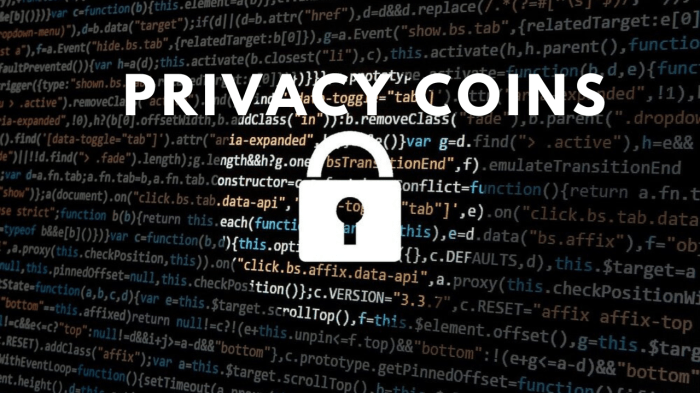Privacy coins are the superheroes of the cryptocurrency world, ensuring your financial transactions remain confidential and secure amidst a sea of digital chaos. From Monero to Zcash, these coins offer a shield of anonymity that traditional cryptocurrencies can only dream of. Let’s dive into the world of privacy coins and discover how they’re revolutionizing the way we think about digital privacy.
In this article, we’ll explore the key features, technology, market adoption, and regulatory challenges surrounding privacy coins, shedding light on their significance in today’s fast-paced digital landscape.
Overview of Privacy Coins
Privacy coins are a type of cryptocurrency that focuses on enhancing user privacy and anonymity in transactions. Unlike regular cryptocurrencies like Bitcoin, privacy coins incorporate various features to obfuscate transaction details and protect user identities.
Main Features of Privacy Coins
- Stealth Addresses: Privacy coins use stealth addresses to generate unique, one-time addresses for each transaction, making it difficult to trace the recipient.
- Ring Signatures: This feature mixes the sender’s transaction with others in a group, making it challenging to determine the actual sender.
- Confidential Transactions: Privacy coins encrypt transaction amounts, ensuring that the value transferred remains hidden.
Level of Anonymity Provided
Privacy coins offer a higher level of anonymity compared to traditional cryptocurrencies like Bitcoin. While Bitcoin transactions are recorded on a public ledger, privacy coins utilize advanced cryptographic techniques to shield transaction details. This enhanced privacy protection makes it harder to trace transactions back to individual users, offering a greater level of confidentiality.
Popular Privacy Coins

Privacy coins are digital currencies designed to enhance user anonymity and transaction privacy. Some of the most popular privacy coins in the market include Monero, Zcash, and Dash. Each of these coins offers unique features and benefits that cater to users’ privacy needs.
Monero
- Monero is known for its strong privacy features, utilizing ring signatures, stealth addresses, and confidential transactions to obfuscate sender, recipient, and transaction amounts.
- It is open-source and community-driven, with a focus on decentralization and privacy as core principles.
- Monero’s privacy features have made it a popular choice for users looking to conduct private and untraceable transactions.
Zcash
- Zcash offers users the option of shielded transactions, where the sender, recipient, and transaction amount are encrypted on the blockchain.
- It uses zero-knowledge proofs called zk-SNARKs to ensure privacy without revealing sensitive information.
- Zcash provides a balance between privacy and auditability, allowing users to choose between transparent or shielded transactions.
Dash
- Dash, originally known as Darkcoin, offers optional privacy features through its PrivateSend functionality, which mixes transactions to obfuscate their origin.
- It focuses on fast and inexpensive transactions, with a strong emphasis on user experience and ease of use.
- Dash has gained popularity for its unique governance structure and ability to fund development through its treasury system.
Overall, these popular privacy coins cater to different privacy preferences and use cases, offering a range of features to enhance transaction privacy and anonymity in the digital currency space.
Technology Behind Privacy Coins
Privacy coins utilize advanced technology to ensure the anonymity of transactions, making them stand out in the cryptocurrency world.
Encryption Methods
Privacy coins employ strong encryption methods to secure transactions and protect user identities. By using cryptographic techniques, such as advanced algorithms like AES (Advanced Encryption Standard) or RSA (Rivest-Shamir-Adleman), privacy coins ensure that sensitive information remains confidential and secure.
Ring Signatures, Stealth Addresses, and Zero-Knowledge Proofs
– Ring signatures: Privacy coins like Monero use ring signatures to obfuscate the sender’s identity by mixing their transaction with others, making it nearly impossible to trace back to the original sender.
– Stealth addresses: By generating unique one-time addresses for each transaction, privacy coins like Zcash ensure that recipient addresses are not linked to the sender’s public address, enhancing privacy.
– Zero-knowledge proofs: Zcash also utilizes zero-knowledge proofs to verify transactions without revealing any sensitive information, allowing for secure and private transactions on the blockchain.
Advantages and Disadvantages
– Advantages:
- Enhanced privacy and anonymity for users
- Protection against surveillance and tracking
- Secure transactions without compromising confidentiality
– Disadvantages:
- Potential regulatory concerns due to anonymity features
- Complex technology may pose challenges for mainstream adoption
- Possible vulnerabilities in encryption methods that could be exploited
Regulatory Challenges

Privacy coins face various regulatory challenges in different countries, as governments and regulatory bodies are concerned about their impact on financial systems and potential use in illicit activities.
Government Scrutiny, Privacy coins
Privacy coins have often been subject to regulatory scrutiny due to their ability to provide anonymity to users, making it difficult for authorities to track transactions and identify individuals involved.
- For example, in 2018, Japan’s Financial Services Agency (FSA) ordered several cryptocurrency exchanges to delist privacy coins like Monero, Zcash, and Dash due to concerns about money laundering and terrorist financing.
- In the United States, the Financial Crimes Enforcement Network (FinCEN) has issued guidelines for cryptocurrency exchanges to implement anti-money laundering (AML) and know-your-customer (KYC) measures, which could impact the use of privacy coins.
Global Impact
The global nature of privacy coins poses challenges for regulators, as transactions can easily cross borders without being subject to traditional financial regulations.
- Some countries, like China, have taken a hardline approach by banning the use of privacy coins altogether, while others, like Switzerland, have adopted a more permissive stance by allowing regulated exchanges to offer privacy coins.
- Regulators are also concerned about the potential use of privacy coins for illicit activities, such as money laundering, tax evasion, and financing of terrorism, which has led to increased scrutiny and calls for stricter regulations.

